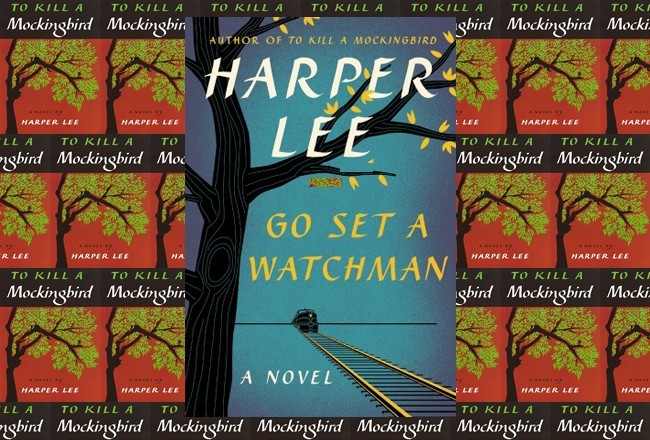
Welcome to part two of FlaglerLive’s live-blogging of “Go Set a Watchman,” the new and controversial novel by Harper Lee. We’ve invited 10 people of varied backgrounds from around the community to read the book and write their response to each of its 19 chapters, from whatever perspective they choose, at whatever length they choose, in 19 installments over the next few weeks.
For a few more details on the project, read the introduction here.
The wild read that began Sunday continues today with responses sometimes radically different one from the other. Some of us are taken in by what looks like a reunion between Atticus and Scout, some of us not so much. As one contributor put it deliciously, “Needs more cow bell.” If that’s not the point of reading, I’m not sure what it. I only wish Harper Lee had all her faculties to enjoy it all, especially since her connection with Flagler is no fiction. We welcome your input if you’d like to do likewise. Each day we start this feature with a brief summary of the chapter at hand (spoiler alert) then go straight into our contributors’ reactions.
–Pierre Tristam
![]()
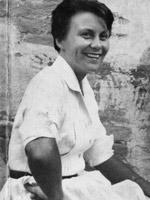
Our Ten Critics: Quick Links
- Today’s Chapter Summary
- Daniel Masbad
- Bill McGuire
- Brian McMillan
- Mary Ann Clark
- Jon Hardison
- Monica Campana
- Darrell Smitty Smith
- Jay Livingston
- Inna Hardison
- Pierre Tristam
![]()
Chapter 2 summary: Atticus and Jean Louise’s reunion at Atticus’s new house, with Aunt Alexandra—Atticus’s sister—and Henry Clinton present. Father and daughter catch up. It’s mostly arm’s length small talk. Jean Louise wants to know the latest dirt. Alexandra gets under her skin, criticizing the way she dresses (an echo of her criticism in “Mockingbird”). We learn that Atticus still doesn’t drink, smoke or womanize, but like his daughter, he plays golf. Toward the end of the conversation and the chapter, Atticus raises the first hint of concern about the political situation: “How much of what’s going on down here gets into the newspapers?” he asks his daughter. He is sensitive to the way Alabama is portrayed in the North. He specifies, referring to “the Supreme Court’s bid for immortality.” It’s an oblique reference to the court’s 1954 Brown v. Board of Education decision that desegregated schools, situating the book’s action around that time. Atticus also asks about the NAACP, but then returns the conversation to Jean Louise’s living status in New York, of which he disapproves.
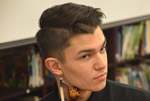 Daniel Masbad, 2015 high school graduate (home-schooled) and concertmaster of the Flagler Youth Orchestra: I can see now that this undertaking will be more difficult than I had first imagined. Chapter Two is mostly dialogue, and if the dialogue of One was stilted and inorganic, that of Two is bizarre. Jean Louise and Hank reach home and are met by Atticus Finch (I see William Eggleston) and Aunt Alexandra. Jean Louise greets her father, her aunt, then takes a pack of cigarettes and hurls them at a couch. What is this? We hear of a death, the son of an individual who Alexandra may or may not be courting; he is Alexandra’s first cousin, a fact Jean Louise says doesn’t matter at “this stage of the game.” “…this stage of the game?” Jean Louise taps Hank because she doesn’t want him and Atticus to start a business conversation. We hear about a divorce. Aunty Alexandra criticizes Jean Louise’s state of dress. Atticus calls Jean Louise “Scout.” Jean Louise says she had dinner when in truth she had not had dinner. Atticus does not drink coffee. Or whiskey. Atticus does not cigarette [verb] or women [verb], but he does manage to have fun. However, he can’t really golf. Jean Louise does something with golf apparatus; Aunty fetches cake and coffee, comments on rug. Some talk of newspapers. Alexandra’s Cousin Edgar thinks Jean Louise should be beaten; she is “independent.” He is a catfish.
Daniel Masbad, 2015 high school graduate (home-schooled) and concertmaster of the Flagler Youth Orchestra: I can see now that this undertaking will be more difficult than I had first imagined. Chapter Two is mostly dialogue, and if the dialogue of One was stilted and inorganic, that of Two is bizarre. Jean Louise and Hank reach home and are met by Atticus Finch (I see William Eggleston) and Aunt Alexandra. Jean Louise greets her father, her aunt, then takes a pack of cigarettes and hurls them at a couch. What is this? We hear of a death, the son of an individual who Alexandra may or may not be courting; he is Alexandra’s first cousin, a fact Jean Louise says doesn’t matter at “this stage of the game.” “…this stage of the game?” Jean Louise taps Hank because she doesn’t want him and Atticus to start a business conversation. We hear about a divorce. Aunty Alexandra criticizes Jean Louise’s state of dress. Atticus calls Jean Louise “Scout.” Jean Louise says she had dinner when in truth she had not had dinner. Atticus does not drink coffee. Or whiskey. Atticus does not cigarette [verb] or women [verb], but he does manage to have fun. However, he can’t really golf. Jean Louise does something with golf apparatus; Aunty fetches cake and coffee, comments on rug. Some talk of newspapers. Alexandra’s Cousin Edgar thinks Jean Louise should be beaten; she is “independent.” He is a catfish.
Yes, my thoughts are jerky, and so, I feel, is this chapter. It was a bit like a serial killer’s note of pasted clippings. I felt that very little of the interaction within was natural, and I think that this chapter could be condensed into a single point: Jean Louise got home. Is Schizopolis coming to mind, or is it a TIA?
 Bill McGuire, Palm Coast City Councilman and management consultant: [See McGuire’s segment on Sunday, where he incorporated his reactions to chapters 1 and 2 in the same piece.]
Bill McGuire, Palm Coast City Councilman and management consultant: [See McGuire’s segment on Sunday, where he incorporated his reactions to chapters 1 and 2 in the same piece.]
 Brian McMillan, columnist and executive editor of the Palm Coast Observer:In chapter 2, I’m interested in the point of view. We are in third person for the whole novel, I assume, but at times we are closer to one character than another, and Harper Lee’s narrator seamlessly moves from brain to brain.
Brian McMillan, columnist and executive editor of the Palm Coast Observer:In chapter 2, I’m interested in the point of view. We are in third person for the whole novel, I assume, but at times we are closer to one character than another, and Harper Lee’s narrator seamlessly moves from brain to brain.
Atticus is reading a book and he “leaned forward a little, the better to disapprove of what he was reading.” In whose point of view is that observation? It’s not Atticus, but it’s also no other character, exactly, because we don’t even know that anyone else is in the room yet. It’s the narrator making us feel like we know him better than we do. A great trick.
Then, “a friend […] would expect a dry ‘H-rm’ to come soon.” And what do we get in the next paragraph? Atticus says “H-rm.” Lee has implanted a thought in our minds and then used that thought to make us feel like we know Atticus better than we do, yet again. Another great trick.
On page 20, Jean Louise pats Henry on the arm, “more to keep him from starting a business conversation with Atticus than anything else.” So here we are in her point of view. And in the next sentence, we shift to Henry’s: He “interpreted it as a warm gesture and returned it.” Poor Henry! But we also see Lee’s deft moves, shifting points of view in back to back sentences. She’s efficient, not wasting a moment by staying in one person’s point of view longer than would be useful.
Last thought: Atticus and Jean Louise have a conversation about politics. I’m mostly ignorant about the details they’re discussing, and it makes me wonder about Harper Lee’s intentions. The characters seem to assume — and the narrator doesn’t offer any further clarification — that the reader will know the context of the references to the Supreme Court, etc. This could be a clue that Lee intended for the novel to be read by contemporaries. She, of course, wrote the novel decades ago, and it wasn’t for a future audience. I wonder why she decided all those years ago not to pursue publishing the novel.
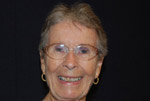 Mary Ann Clark, founder of Flagler Reads Together and president of the Flagler County Historical Society: Jean Louise, still the rebel, teasing Aunt Alexandra and sending Christmas cards to locals with NAACP stickers affixed! I must admit for a moment I didn’t really understand Atticus’ reference to “politics” until I read Mississippi.
Mary Ann Clark, founder of Flagler Reads Together and president of the Flagler County Historical Society: Jean Louise, still the rebel, teasing Aunt Alexandra and sending Christmas cards to locals with NAACP stickers affixed! I must admit for a moment I didn’t really understand Atticus’ reference to “politics” until I read Mississippi.
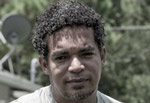 Jon Hardison, co-owner of Ha Media in Palm Coast and member of the FlaglerLive board of directors: I hate saying this about the second chapter. I really do.
Jon Hardison, co-owner of Ha Media in Palm Coast and member of the FlaglerLive board of directors: I hate saying this about the second chapter. I really do.
I have nothing to say.
Atticus enters, stage left and the banter ensues. The uptight, socially over-concerned Aunt enters stage right and the nature of their relationships are made clear. The most notable thing about Chapter 2 is the almost unhealthy interest the author seems to have in what each character’s eyebrows are up to. They’re raised, but then lowered again. There may have been some furling. Yep. Part II is the eyebrow chapter.
(Jon drags himself on to chapter 3, expectations lowered but intact.) (His eyebrows hang sarcastically, straight lines that seem to cut the whites of his eyes right down the middle like Garfield in a Lasagna-less moment.)
 Monica Campana, just-retired head librarian at Indian Trails Middle School and free-speech advocate: Hello, Atticus. Not so pleased to meet you. The sweet, stalwart southern gentleman lawyer expresses his indignation about a critique of the Alger Hiss case and he pumps Jean Louise on the North’s opinion of the NAACP. The seeds are poorly planted for the Atticus we do not wish to get to know, as the writing is difficult to follow. Peppered with stilted, choppy conversations and references not clarified—“Mississippi business”? Which business is Scout referring too? There were so many horrific cases during that time. I’m really not sure which Supreme Court “bid for immortality” Atticus is so derisive of, but I assume it is Brown v. Board of Education. Thank goodness for editors. Now that anyone can publish probably doesn’t mean that everyone should.
Monica Campana, just-retired head librarian at Indian Trails Middle School and free-speech advocate: Hello, Atticus. Not so pleased to meet you. The sweet, stalwart southern gentleman lawyer expresses his indignation about a critique of the Alger Hiss case and he pumps Jean Louise on the North’s opinion of the NAACP. The seeds are poorly planted for the Atticus we do not wish to get to know, as the writing is difficult to follow. Peppered with stilted, choppy conversations and references not clarified—“Mississippi business”? Which business is Scout referring too? There were so many horrific cases during that time. I’m really not sure which Supreme Court “bid for immortality” Atticus is so derisive of, but I assume it is Brown v. Board of Education. Thank goodness for editors. Now that anyone can publish probably doesn’t mean that everyone should.
 Darrell Smitty Smith, Flagler Beach AC technician, FlaglerLive contributor and George Carlin reincarnation: [Smitty told us last night he worked best on deadline, and was therefore going fishing. We hope he’s either still fishing or sleeping it off. Either way, his return is a matter of syllables.]
Darrell Smitty Smith, Flagler Beach AC technician, FlaglerLive contributor and George Carlin reincarnation: [Smitty told us last night he worked best on deadline, and was therefore going fishing. We hope he’s either still fishing or sleeping it off. Either way, his return is a matter of syllables.]
 Jay Livingston, attorney with Livingston & Sword in Palm Coast: A family reunion. A daughter returned but not just grown up. She is bold and assertive, dominating the room with her father’s quiet and proud approval. Not a child spouting truth through naivete but a woman–sure of herself but also sarcastic and blunt. Finding a place for her cigarettes first on the couch before settling herself. Apparently at war with her old-fashioned and disapproving aunt and shocked at the thought of old friends divorcing, although it seems they are not the only acquaintances Jean Louise knows whose marriage has failed. If there is something in the water, as she ruminates, then others must be at the well. The author spells out her name “Jean Louise” again and again so we do not lose track and think of her as that little girl. But just before the girl vanishes Atticus calls out to “Scout” to diffuse the tension with her aunt and we are reminded.
Jay Livingston, attorney with Livingston & Sword in Palm Coast: A family reunion. A daughter returned but not just grown up. She is bold and assertive, dominating the room with her father’s quiet and proud approval. Not a child spouting truth through naivete but a woman–sure of herself but also sarcastic and blunt. Finding a place for her cigarettes first on the couch before settling herself. Apparently at war with her old-fashioned and disapproving aunt and shocked at the thought of old friends divorcing, although it seems they are not the only acquaintances Jean Louise knows whose marriage has failed. If there is something in the water, as she ruminates, then others must be at the well. The author spells out her name “Jean Louise” again and again so we do not lose track and think of her as that little girl. But just before the girl vanishes Atticus calls out to “Scout” to diffuse the tension with her aunt and we are reminded.
Atticus remains the lawyer. Wanting to spend time with his daughter by playing a round of golf but first checking the calendar to see if he has any free time. Unable to tie his shoes because of what must be debilitating arthritis. I wonder if he can hold a club. If he cannot then does he regret the shots he never took and never will because of his sense of duty to his clients?
Outside and around them history is unfolding. Those that live there wonder what Jean Louise has heard from her perch in New York City as the tyranny of the Old South is diminishing. Each newspaper has the narrative it wants to tell whether or not the story is accurate. She is irreverent to it all, to what is happening where she is from and her adopted home. When I went to college in upstate New York I found myself defending the south way more than I expected from my Yankee fiends’ own unique ignorance. I image Jean Louise has had the same arguments. I think I like this grown up Scout. I think her father does too.
 Inna Hardison, co-owner of Ha Media and former publisher of Palm Coast Lifestyles magazine: “Needs more cow bell.”
Inna Hardison, co-owner of Ha Media and former publisher of Palm Coast Lifestyles magazine: “Needs more cow bell.”
Seriously, I’ve no bloody clue what to say about this one, except for when I got to part where Scout’s daemon rose to dominate her, I almost threw up a little.
The first few minutes of each other’s company after what I am assuming was a year-long absence of same made for a torturous encounter, without me (yet, maybe) having the benefit of knowing anything about where the jibes or the coldness or the “suffering” of an embrace came from. The entirety of the exchange between Atticus and Scout left me oddly uncomfortable, as if I accidentally stumbled into a quarrel in a foreign language.
All I got out of it is that I am supposed to despise Alexandra, the dutiful sister and an insufferable aunt. I tend to despise those characters by rote, so that didn’t need any additional promptings.
Here is to hoping I have something a tad more intelligent or at least coherent to contribute to the next one.
Onward.
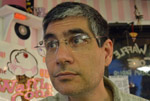 Pierre Tristam, editor of FlaglerLive: Atticus and Jean Louise meet again: “He suffered her embrace.” A much-anticipated father-daughter reunion between John Voigt and Angelina Jolie (or Lionel and Nicole Richie), this isn’t. These two don’t seem to like each other much. But the “much-anticipated” part would be an anachronism: I have to keep reminding myself that, according to the official Lee chronology, these pages were written before “Mockingbird”’s. Had Lee rather than her editor had her way in 1957, this would have been our first introduction to Atticus, though for us post-Mockingbird children he’s the same as for Jean, who “always thought of him as hovering somewhere in his middle fifties—she could not remember him being any younger, and he seemed to grow no older.” That line still reads like an editorial insert from HarperCollins’s marketing department, a nod to readers made restless by the jarring way these characters have aged.
Pierre Tristam, editor of FlaglerLive: Atticus and Jean Louise meet again: “He suffered her embrace.” A much-anticipated father-daughter reunion between John Voigt and Angelina Jolie (or Lionel and Nicole Richie), this isn’t. These two don’t seem to like each other much. But the “much-anticipated” part would be an anachronism: I have to keep reminding myself that, according to the official Lee chronology, these pages were written before “Mockingbird”’s. Had Lee rather than her editor had her way in 1957, this would have been our first introduction to Atticus, though for us post-Mockingbird children he’s the same as for Jean, who “always thought of him as hovering somewhere in his middle fifties—she could not remember him being any younger, and he seemed to grow no older.” That line still reads like an editorial insert from HarperCollins’s marketing department, a nod to readers made restless by the jarring way these characters have aged.
Atticus is fussy. Jean Louise is contentious. Clearly, Atticus is defensive, and not just because he’s been reading about Alger Hiss: he’s experienced his daughter’s abrasiveness before. His guard is up and Lee gives us no sense of his more inner thoughts. As in “Mockingbird,” what we know of Atticus is entirely external, deduced from what he says and does, never what he thinks. He says a few things here. But the small talk is not revealing. Lee has a little fun at the expense of her characters, giving her voice more presence than the novel needs, as with lines like “only God and Robert Browning knew what she was likely to say” and the cliche that “there must be something in the water” to reflect Jean Louise’s exasperation with the goings on in Maycomb.
The chapter re-introduces us to Aunt Alexandra the fashion Nazi and her weird obsession with Jean Louise’s clothes. The obsession recurs so much between “Mockingbird” and “Watchman” that Alexandra’s desire to rip off her niece’s clothes seem to me aroused by a bit less than her fashion policing and a bit more by what could be her repressed but unmentionalble attraction to the girl. Nothing else can explain the fixation. (Lee had to find a way to assuage–to use a favorite word of hers–her friend Truman Capote’s sense of humor.) “Aunt Alexandra was fanatical about the subject of my attire,” we read in “Mockingbird,” so nothing has changed.
Alexandra and Jean Louise go at it, Alexandra accusing her of “slumming” because she wears slacks, and Jean Louise reminding her how “Maycomb knows I didn’t wear anything but overalls till I started having the Curse.” That of course snaps arthritic Atticus to attention with a “That’ll do, Scout.” It’s the first occurrence of the old “Mockingbird” nickname, the first of 45 in “Watchman,” a nostalgic marker that tells us Lee did not intend us–if she intended us to do anything at all with Watchman–to keep our comparative references in the closet.
There’s a hint of the political chatter to come with Atticus’s questions about how Alabama is perceived up north, but it’s all abbreviated, as much by Lee as by her characters, who aren’t interested in sustained conversation just yet. It’s as if the chapter was written then eviscerated. Regardless: Twenty-five pages in, I’m bored, and getting not a little pissed at the elephantine lawyer in the room: not Atticus, but Tonja Carter, the lawyer who, like the book she dragged into print, can’t keep her stories straight about how this book saw publication.





























Leave a Reply